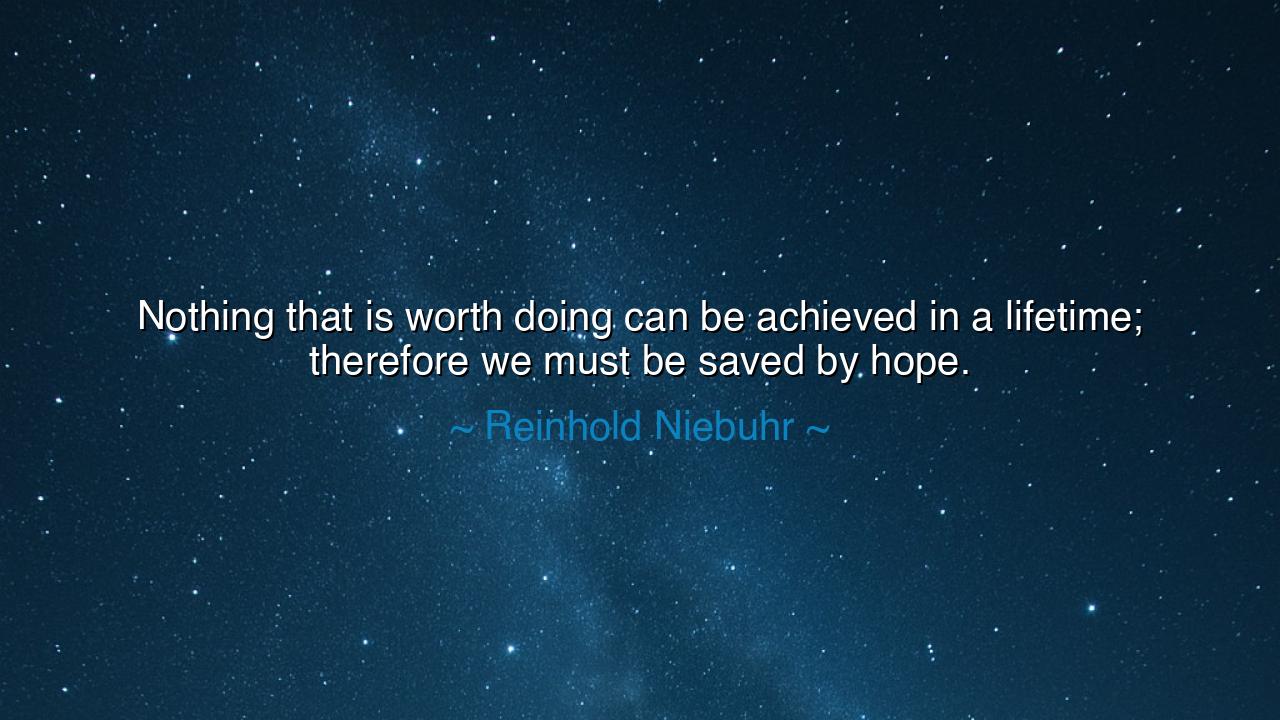
Nothing that is worth doing can be achieved in a lifetime;
Nothing that is worth doing can be achieved in a lifetime; therefore we must be saved by hope.






“Nothing that is worth doing can be achieved in a lifetime; therefore we must be saved by hope.” Thus spoke Reinhold Niebuhr, the theologian and moral philosopher whose words bridged the spiritual and the temporal. In this single sentence, he captured a truth that humbles all ambition: that the works most worthy of humanity—justice, peace, love, and wisdom—are greater than any one life. They are the labors of generations. Niebuhr’s message is not of despair, but of reverence; he reminds us that our brief existence is but one verse in a far greater song. We may not see the final harmony, but we must still sing our part. For without hope, the melody would die in silence.
Niebuhr’s words were born from the turmoil of the twentieth century, a time of war, cruelty, and doubt. He saw nations rise and fall, ideologies clash, and empires crumble under the weight of pride. He understood that the human condition is both noble and flawed—that our reach always exceeds our grasp. And yet, he did not preach resignation, but redemption through perseverance. To him, hope was not idle wishing, but the sustaining faith that what we begin in our time will be completed in another. The great works of humanity—freedom, learning, compassion—move forward not by the might of a single generation, but by the slow and sacred patience of many.
To say that “nothing worth doing can be achieved in a lifetime” is to acknowledge both the limitation and the glory of being human. For the very finitude of our days makes every act of goodness sacred. The builder of a cathedral knows he will not live to see its towers rise; yet he lays each stone as though it were eternal. The teacher may never know how her words shape the minds of tomorrow, yet she teaches still. The activist who fights for justice may not live to see it triumph, yet he plants the seed of change. Thus, our lives become threads in the vast tapestry of time—each fragile, yet essential to the whole.
Consider the life of Martin Luther King Jr., who fought for equality knowing that he might never walk in the promised land he envisioned. He labored, not for immediate reward, but for a dream that would outlive him. His struggle was unfinished at his death, yet it endured, carried forward by those who heard his call. King understood Niebuhr’s wisdom instinctively: that the worthiest battles are never truly concluded, for they belong not to one age, but to the spirit of humanity itself. Hope, for him, was both weapon and salvation—the power to believe in dawn even while surrounded by darkness.
The ancients, too, knew this truth. The builders of the Great Wall of China, the sculptors of the Parthenon, the scribes who preserved sacred texts—they all worked in the shadow of mortality, yet for the light of eternity. Their hands are long dust, yet their works endure, whispering across the centuries that beauty and meaning are not measured by completion, but by devotion. Hope, in this sense, is the thread that binds the living and the dead, the past and the future. It is the faith that though we shall vanish, the good we do will not.
Niebuhr’s teaching also carries a moral humility. It reminds us that no single person, however wise or powerful, can claim to possess the final truth. Perfection lies beyond our grasp, and that is why faith—whether in God, humanity, or the unfolding of justice—is essential. Hope saves us from arrogance and despair alike. It tempers the pride that believes it can accomplish all things, and the sorrow that believes nothing can be done. It is the middle path—the golden flame that flickers yet never dies, guiding us forward when reason alone cannot.
From this wisdom, let us draw a lesson for our own time: do not measure your life by what you finish, but by what you begin. When you love, love deeply even if it cannot be returned in full. When you serve, serve faithfully even if the results are unseen. When you strive for justice, do so with courage, even if the world resists you. Know that your actions are seeds cast into the soil of eternity, and that hope is the sun that will one day bring them to bloom. The tree of goodness grows slowly, but its roots are eternal.
And so, as Niebuhr reminds us, hope is not weakness—it is endurance made divine. It is the faith that our lives, however brief, participate in a story far greater than ourselves. We are the gardeners of a future we may never see, yet whose beauty we help to shape. Let us therefore act, not for glory, not for reward, but for the simple, sacred joy of knowing that what we do in love will outlive us. For though our time is short, the work of the soul is eternal—and hope is the bridge that carries it beyond the reach of death.






AAdministratorAdministrator
Welcome, honored guests. Please leave a comment, we will respond soon